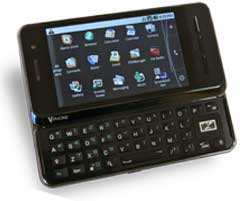
What happened to the Android video chat phone I was expecting?
Saygus has been showing off its Android-based Vphone platform since November, so I was eager to get my hands on it to check out its noted two-way video chat capability. The CEA even gave the company an award for its innovation in low-latency 3G video chat.
Up until now, the company has only shown off the VPhone (or V1) handset, a very bulky, but respectably designed dual-camera slider. The video chat service had not been widely shown in action.
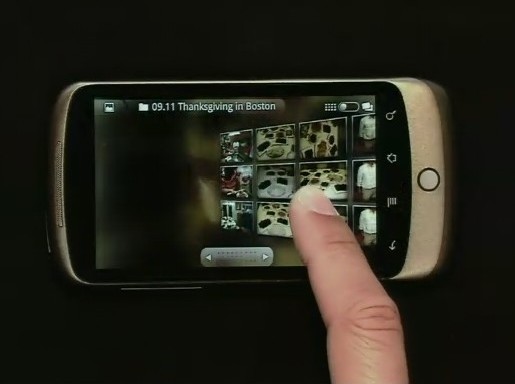
Nexus One: More than a phone, less than a game-changer
Call me hopeful that Google's announcement of Nexus One Tuesday helps it positively influence the evolution of an open, innovative wireless market. Call me similarly hopeful that Google's move into hardware -- a bold decision that builds on its earlier success facilitating the creation of the Android mobile operating system and orchestrating the Open Handset Alliance's go-to-market plans -- will drive the success of the next truly competitive smartphone platform.
But as hopeful as I am, I'm not yet convinced that one phone can ever deliver all the goods. Nexus One is hardly the earth-shattering, apocalyptic shot that will catapult the smartphone market into next week.

Marvell shows off the 'Alex' Android-based e-reader
Just a day before Barnes and Noble launched its Nook e-reader, a heretofore unheard of company called Spring Design sent out a mass-mail press release which showed its own dual-screen, Android-based e-reader called "Alex."
Like clockwork, the company filed suit against Barnes & Noble, claiming that the Nook copied its features, but without actually showing off a real product of its own.

Popcorn Hour becomes Popbox, tries to take on Roku and Boxee
Syabas Technology scored a minor hit with its Popcorn Hour streaming set top box, but it didn't grab as big of an audience as Roku did with its $99 Netflix streamer, nor did it become quite a geek favorite like Boxee.
So this time around, the company has made its product a bit sleeker, a bit shinier, and given it a name a bit less dorky. In March, the Popbox will make its official debut. The new set top box includes Netflix 2.0, Revision3, Channels.com, Shoutcast, Photobucket, Weatherbug, Twitter, games from Funspot, and all the expected Networked Media Tank features for streaming content over your home network.

AT&T completes HSPA 7.2 software upgrade, does not promise faster speeds
Complaints about AT&T's network may have reached the point of ridiculousness recently, but the wireless carrier today announced that the software for its 3G sites has been completely upgraded to support HSPA 7.2, which could improve connection reliability.
AT&T announced the upgrade to HSPA 7.2 in May, which promised to raise its maximum 3G downlink speed from 3.6 Mbps to, what else, 7.2 Mbps.
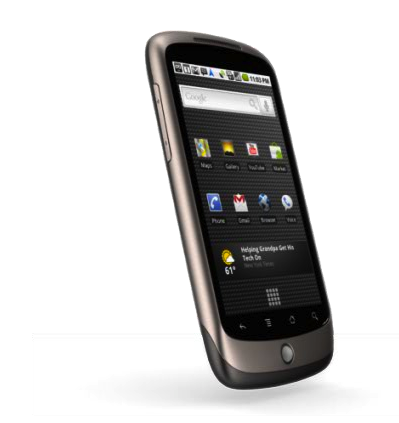
Google soars past Apple and Microsoft with Nexus One superphone
Today's Google Nexus One launch is as game changing as Apple's June 2007 release of the iPhone. Perhaps, Nexus One is more important, although judging from blogs and tweets, geekdom doesn't yet get it. Apple supercharged the smartphone category with a more natural user interface. Suddenly, there was a new way to interact with a mobile phone that was seemingly magical. Today, Google turned on the superpowers, by finally starting to integrate cloud services into its mobile platform in a hugely useful way. Additionally, Google is transcending the limitations of one natural user interface by extending the capabilities of another.
With Nexus One and Android 2.1, Google is doing what Microsoft failed to with its March 2007 Tellme acquisition: Offer a more natural mobile phone user interface. Voice should have been it, but Microsoft failed to bring the technology to Windows Mobile in a big way. By comparison, Google has been hot on voice search, which promises to be much better on Nexus One and other handsets running Android 2.1. Google is extending voice search to other services, which just last week I blogged the information giant should be doing.
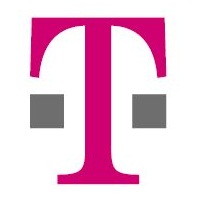
T-Mobile to bring 21 Mbps HSPA+ to US this year
T-Mobile may not be the exclusive carrier of the Nexus One, as was previously expected, but the wireless carrier had another big announcement up its sleeve: HSPA+.
T-Mobile has been testing the "3.5G" network technology in Philadelphia since mid-2009, and the company today said it will have the technology deployed across its network by mid-2010.

Would anyone care for a 'superphone?' Google's platform play with Nexus One
The new Google Nexus One shows 'Live Wallpaper,' with its own interactive water puddle.
The trifecta that was Apple's iPhone introduction in January 2007 was on account of the successful introduction of a software platform and a truly revolutionary device, coupled with a massive surge in the functionality of iTunes -- a compelling device on an intriguing platform, which itself was on a respected and advanced platform. Matching that achievement quite literally may never be possible for a smartphone, but it may be possible for something else.

Can the Nexus One turn Google users into Android phone users?
Without Google and HTC, there would be no Android, plain and simple. But can these two companies, after establishing Android's presence in the mobile world, re-imagine the way that mobile devices are sold?
We're about to find out.

Bowling for smartbooks: Qualcomm's and Lenovo's bid for a new platform
The hope of small processor manufacturers like ARM, and connectivity platform makers like Qualcomm, is to carve a space for themselves in the price/performance spectrum someplace in-between the smartphone and the netbook, in an area some analysts have said is too narrow to start an empire. They hope to build an Web-enabled computer without the aid of traditional players such as Intel, AMD, and Nvidia, and they want to do it on their terms.
Qualcomm introduced its Snapdragon chipset platform (actually just a single chip) just before CES 2009, with the intention of building CDMA-enabled smartbooks that run on batteries and power up through adaptors like cell phones, but can surf the Web, use Web apps, and play movies like netbooks. Snapdragon is centered around single-core ARM processors timed at around 1 GHz.
At first, Qualcomm mentioned Windows Mobile along with Android as the operating systems that would lead the way for Snapdragon-based devices. Indeed, WM6 provided the software platform for one of Snapdragon's first entries in January 2009, Toshiba's TG01. But since then, the Windows Mobile talk has died down; the next big entry for Snapdragon thus far has been the Acer Liquid.

Can big trade shows survive Apple and Google?
How strange is it that perhaps the two biggest product announcements this month will come right before major trade shows, rather than during them? In less than two hours, Google is expected to officially launch the Nexus One smartphone at an event in Northern California. The Consumer Electronics Show kicks off with tomorrow night's Microsoft CEO Steve Ballmer keynote. Apple is expected to unveil some new product, presumably a tablet PC, during another Northern California event on January 27. Macworld Expo opens about two weeks later.
The separate event strategy is about managing the message -- controlling mindshare -- being the one and only voice instead of one of many. The problem with big trade shows is the size. There are so many new product announcements, many good ones get lost in the noise. By holding separate big events, Apple and Google can capture the most publicity for the buck -- as in what they spend to host their own events and what they don't spend to attend the trade show or for additional marketing. It's a strange turnaround. Tech companies are supposed to ride the tradeshow's coattails by attending the event.
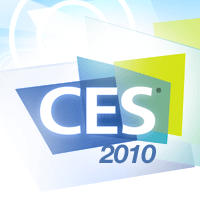
CES 2010 Flashpoints: The platforms for the next decade in electronics
The world does not run on gadgets. Consumers purchase gadgets as investments in the functionality that they provide. Gadgets are handles to their underlying platforms.
Every year, the Consumer Electronics Show is a gauge of the directions in which platforms are moving, a barometer of the evolution of functionality. Sure, we see plenty of neat toys, many of which end up either being for kids or making us feel like kids. And sure, we hear plenty of loosely coupled metaphors that play to our need to be excited, like how a certain device unleashes connectivity or harnesses the power of disruption -- phrases that read like they were assembled using that word game you play with refrigerator magnets.

Nokia adds 14 patents to complaint, citing Jobs' 'Great artists steal' comment
Responding to Apple's vehement countersuit against Nokia, in which it leveled 13 patent infringement allegations against Nokia's 10, last December 29, Nokia added 14 more to the mix, including for concepts that may perhaps be as integral to the construction of modern telephones as power-conserving voltage-controlled oscillators, and a sensor that de-activates touchscreens while the phone is held against the ear.
The assertion made in Nokia's latest amended complaint is that Apple based the design of the iPhone around Nokia concepts, implying that Apple may have actively reverse-engineered Nokia's phones to do so -- rather than stumbling upon the same concepts accidentally in its own research. Upholding the notion that Apple would rather steal than innovate, Nokia cites a 1996 statement made by Apple's then-former-CEO Steve Jobs, in a PBS documentary by Robert X. Cringely entitled "Triumph of the Nerds."

5 things I know to be true about the Apple tablet
If you're looking for leaked Apple tablet product specs and photos, this post isn't for you. But if you're interested in a hearty (and discussion disrupting) list describing what the product's impact already is (and will be, if released), please read on.
1. It's mythical. Like the sasquatch, unicorns or alien invaders (yeah, yeah, the truth is out there), the Apple tablet doesn't exist until someone finds one. Sure there are rumors and unconfirmed sightings. But no one outside Apple or its NDA-bound partners/developers really knows what it is, or if it really exists. The government may have successfully guarded its Area 51 secrets (downed alien aircraft or U.S. test plane?), but the G-Men are in many respects no match for Apple. No one protects super secret projects like Apple. Much of the information out there is likely false.

The world does need a tablet, but not the one you're thinking
The problem with a manufacturer creating a new market is that it must demonstrate a latent need among a sizable plurality of potential consumers, for a product they don't know they need. No one ever needed an iPhone...until round about January 2007.
The current debate about the probable Apple tablet, or tablet-like, product, whose formal announcement is slated for January 26 in San Francisco, is really about whether another latent, iPhone-like need actually exists, or whether Apple may be tapping for oil where there is no oil -- something the company has done in its history, more than once. The debate was joined last week by our Betanews contributors: independent analyst Carmi Levy, who argued in favor of breaking through the smokescreen of hype and reassessing our priorities with respect to personal and business needs and wants; and former Jupiter analyst Joe Wilcox, who argued that Apple has not demonstrated a market need for the type of device that most reasonable speculation and analysis projects an Apple tablet device to be.